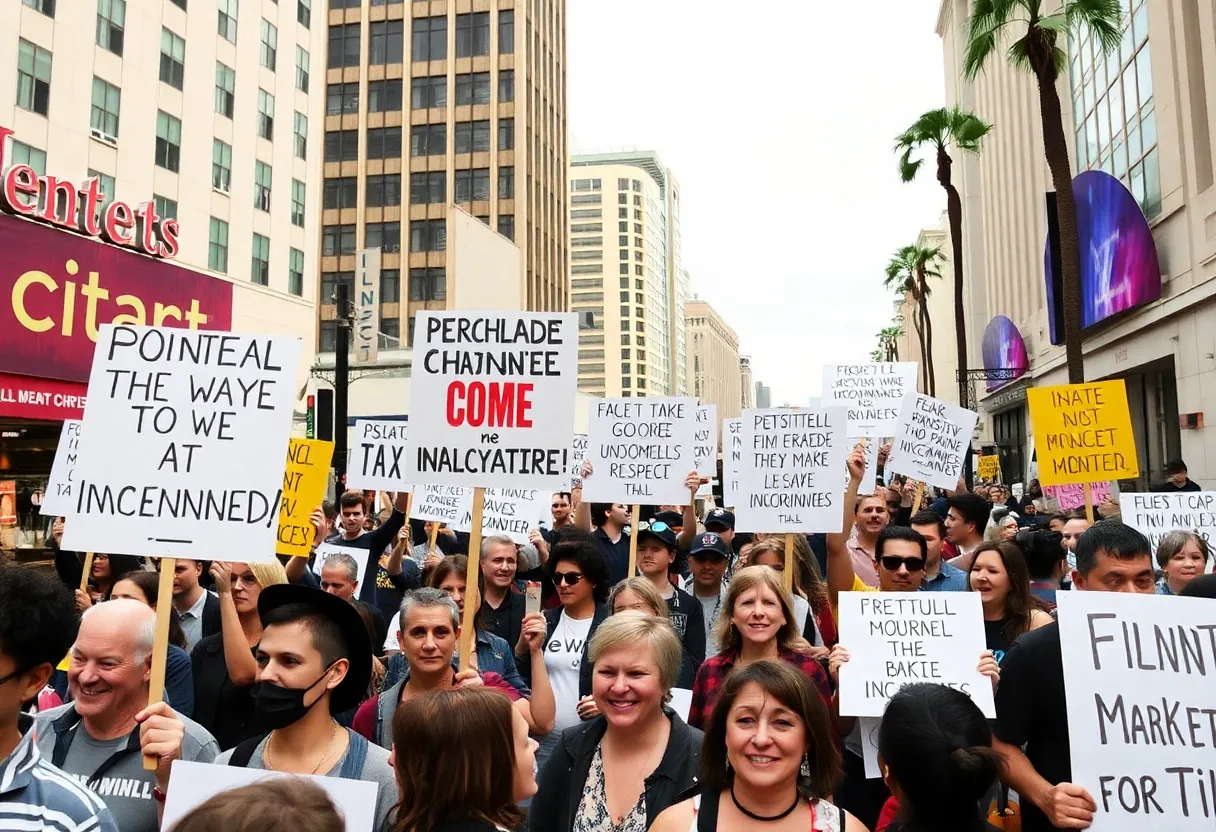News Summary
A grassroots movement in California is advocating for increased tax incentives to support the film and television industry, with industry workers and policymakers gathering in Sun Valley at the ‘Stay in L.A.’ event. They are pushing for an increase in state production incentives from $330 million to $750 million to combat declining production rates. Proposed changes would raise tax credits and expand eligibility, aiming to enhance California’s competitiveness and secure local jobs as on-location production continues to decline.
California has become the focal point of a significant grassroots movement advocating for expanded tax incentives to bolster the struggling film and television production industry. Hundreds of industry workers, labor leaders, and policymakers gathered in Sun Valley at the “Stay in L.A.” event to urge California Governor Gavin Newsom to increase the state’s film and television production incentives from $330 million to $750 million annually.
The rally served as a platform for individual testimonies highlighting the hardships faced by those in the industry due to diminishing production work. Attendees emphasized the stark disparity in existing tax incentives, which primarily affect working-class and middle-class creatives and crew members essential to the industry’s vitality.
Proposed changes aim to raise the film and television tax credit from the current range of 20% to 25% to a new proposed level of 35%. The new legislation would also expand eligibility to encompass animation, large-scale competition shows, and shorter television series, enhancing California’s competitiveness against other states and countries that have favorable tax strides, such as Georgia, Canada, and the U.K.
Reports indicate that on-location production in California is in decline, with a staggering 22% decrease in the first quarter of 2024. More specifically, television production has dropped by 58% over three years, creating an urgent need for intervention in the form of increased financial support and incentives. In response to this downturn, lawmakers in Los Angeles are pushing for measures like streamlining film permits and boosting tax credits to retain production jobs.
The “Stay in L.A.” movement emerged after recovery efforts from the Pacific Palisades and Altadena fires and aims to encourage more local productions to maintain job opportunities. Organizers are also seeking commitments from major studios to keep set production in Los Angeles, although public responses from these studios are lacking.
Those involved in the event emphasized the crucial roles that various crew members—such as grips, costumers, and drivers—play in the success of film and TV productions. According to industry representatives, the film sector supports numerous jobs and significantly shapes California’s identity, reinforcing the rationale for proposed tax incentives.
Data reflects a widespread demand for change, with over 100,000 letters of support for the proposed tax credits sent to state lawmakers, evidencing robust grassroots activism. Despite this, the proposed legislation has experienced some hurdles in the California legislature and will need to navigate challenges from politicians who represent regions outside of entertainment-centric areas.
Critics have raised concerns regarding the value of tax credits, questioning their actual impact on California’s overall economy and the opportunity costs associated with allocating funds to the film industry. Nevertheless, advocates argue that an expansive tax credit would generate substantial economic benefits transcending the film sector, positively influencing tourism and supporting local small businesses.
As the call to action continues, attendees at the “Stay in L.A.” event urged participants to engage with their elected representatives, advocating for support for the tax credit proposals. Industry leaders warned that without effective measures, California risks witnessing another decline analogous to what occurred in Detroit, emphasizing the urgent need to address the waning production jobs in Hollywood.
Overall, the rally underscored both an urgent call for support within the film community and a critical moment for systemic change in California’s approach to the industry amidst an increasingly competitive market.
Deeper Dive: News & Info About This Topic
- ABC7: Can Tax Credit Save Hollywood?
- Los Angeles Times: California Production Incentive Program
- Reuters: Voight Seeks to Revive Hollywood’s Golden Age
- Google Search: California Tax Credits Film Industry
- Variety: Michelle Pfeiffer on LA Tax Incentives
- Encyclopedia Britannica: Film Industry

Author: STAFF HERE CORONADO
The Coronado Staff Writer represents the experienced team at HERECoronado.com, your go-to source for actionable local news and information in Coronado, San Diego County, and beyond. Specializing in "news you can use," we cover essential topics like product reviews for personal and business needs, local business directories, politics, real estate trends, neighborhood insights, and state news affecting the area—with deep expertise drawn from years of dedicated reporting and strong community input, including local press releases and business updates. We deliver top reporting on high-value events such as the Coronado Island Film Festival, productions at Lamb’s Players Theatre, community workshops at John D. Spreckels Center, and iconic celebrations at Hotel del Coronado. Our coverage extends to key organizations like the Coronado Chamber of Commerce and Visit Coronado, plus leading businesses in hospitality, dining, and tourism that drive the local economy. As part of the broader HERE network, including HERESanDiego.com, HEREHuntingtonBeach.com, HERELongBeach.com, and HERELosAngeles.com, we provide comprehensive, credible insights into Southern California's dynamic landscape.





